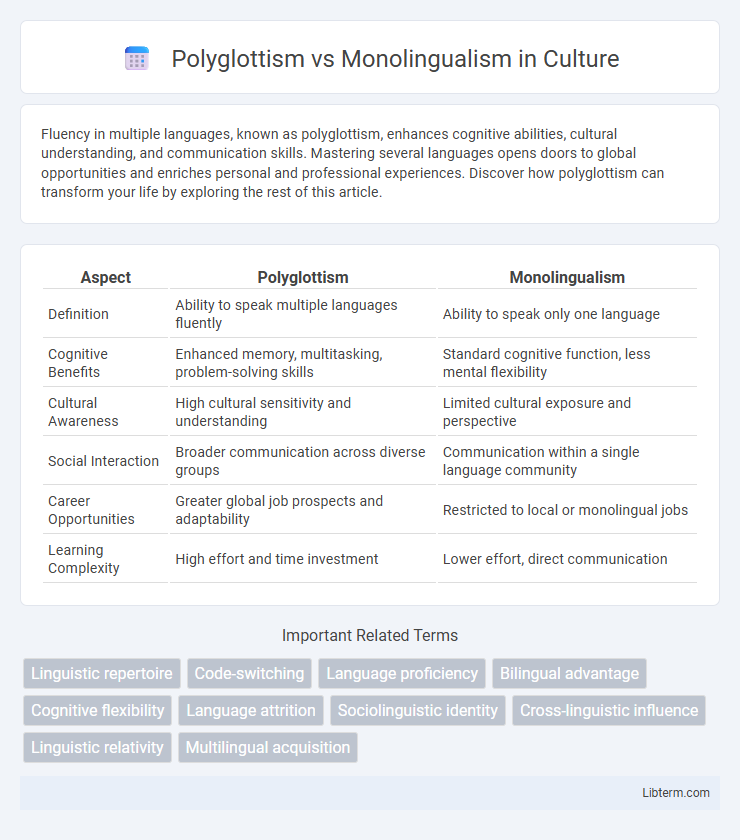Fluency in multiple languages, known as polyglottism, enhances cognitive abilities, cultural understanding, and communication skills. Mastering several languages opens doors to global opportunities and enriches personal and professional experiences. Discover how polyglottism can transform your life by exploring the rest of this article.
Table of Comparison
| Aspect | Polyglottism | Monolingualism |
|---|---|---|
| Definition | Ability to speak multiple languages fluently | Ability to speak only one language |
| Cognitive Benefits | Enhanced memory, multitasking, problem-solving skills | Standard cognitive function, less mental flexibility |
| Cultural Awareness | High cultural sensitivity and understanding | Limited cultural exposure and perspective |
| Social Interaction | Broader communication across diverse groups | Communication within a single language community |
| Career Opportunities | Greater global job prospects and adaptability | Restricted to local or monolingual jobs |
| Learning Complexity | High effort and time investment | Lower effort, direct communication |
Introduction to Polyglottism and Monolingualism
Polyglottism refers to the ability to speak and understand multiple languages, enhancing cognitive flexibility and cultural awareness. Monolingualism involves proficiency in only one language, which can limit cross-cultural communication but often allows deeper mastery of a single linguistic system. Studies show polyglottism promotes brain plasticity and problem-solving skills, while monolingualism remains prevalent in regions with homogenous populations.
Cognitive Impact: Polyglots vs Monolinguals
Polyglotism enhances cognitive flexibility, improving problem-solving, multitasking, and executive function compared to monolingualism. Studies reveal polyglots exhibit increased grey matter density in the brain's language control regions and superior memory retention. Monolinguals tend to have less cognitive resilience in linguistic challenges, highlighting the mental benefits of managing multiple languages.
Social Benefits of Multilingualism
Multilingualism enhances social integration by enabling communication across diverse cultural groups, fostering empathy and reducing social barriers. Studies show that polyglots have improved cognitive flexibility and problem-solving skills, which facilitate better interpersonal relationships. Communities with higher rates of multilingualism experience increased social cohesion, economic opportunities, and global connectivity.
Language Learning and Brain Development
Polyglottism enhances cognitive flexibility and improves executive functions such as problem-solving and multitasking by engaging multiple language systems in the brain. Studies show that polyglots experience increased gray matter density in areas related to memory, attention, and auditory processing compared to monolinguals. Monolingual individuals may have a simpler neural architecture for language but typically demonstrate less neural plasticity and slower adaptation to novel linguistic challenges.
Communication Barriers in Monolingual Societies
Monolingual societies face significant communication barriers, limiting interactions in diverse cultural or international contexts due to reliance on a single language. This linguistic limitation restricts access to global markets, diminishes opportunities for cross-cultural collaboration, and hinders cognitive flexibility. Polyglottism, by contrast, enhances communication skills, promotes understanding across cultures, and facilitates smoother integration in multilingual environments.
Economic Advantages of Speaking Multiple Languages
Speaking multiple languages significantly enhances career opportunities by increasing employability in global markets and multinational companies. Polyglots often command higher salaries and access to a broader range of jobs, especially in industries such as tourism, international trade, and diplomacy. Economic advantages also include improved negotiation skills and the ability to tap into diverse customer bases, boosting business growth and competitiveness.
Cultural Awareness and Global Perspective
Polyglottism enhances cultural awareness by enabling individuals to understand and appreciate diverse linguistic nuances, traditions, and worldviews, fostering deeper intercultural connections. Monolingualism often limits exposure to global perspectives, restricting cognitive flexibility and empathy towards other cultures. Multilingual individuals are better equipped to navigate international environments, promoting inclusive communication and broadening their global understanding.
Education Systems: Supporting Polyglottism and Monolingualism
Education systems supporting polyglottism implement immersive language programs, bilingual curricula, and cultural exchange initiatives to enhance multilingual proficiency and cognitive flexibility. In contrast, monolingual education systems prioritize single-language mastery, often emphasizing standardized testing and uniform linguistic instruction to foster deep content understanding. Research shows that polyglottic education can improve executive functions and global competence, while monolingual models may streamline communication but limit cross-cultural engagement.
Challenges Facing Monolingual and Multilingual Individuals
Monolingual individuals often face challenges in global communication, limited cultural exposure, and reduced cognitive flexibility compared to polyglots, who benefit from multilingualism by enhancing brain plasticity, problem-solving skills, and cross-cultural understanding. However, multilingual individuals may encounter difficulties such as language interference, increased cognitive load, and social identity conflicts. Both monolingualism and polyglottism present unique cognitive and social challenges that impact personal and professional opportunities in an interconnected world.
Future Trends: The Rise of Polyglottism
Polyglottism is projected to rise significantly due to globalization, increasing demand for multilingual professionals, and advancements in language learning technologies such as AI-powered apps and immersive virtual environments. Studies show that polyglots exhibit enhanced cognitive flexibility, making multilingualism a valuable asset in the evolving global economy. Monolingualism may decline as educational systems worldwide increasingly prioritize bilingual and multilingual curricula to prepare students for diverse, interconnected job markets.
Polyglottism Infographic

 libterm.com
libterm.com